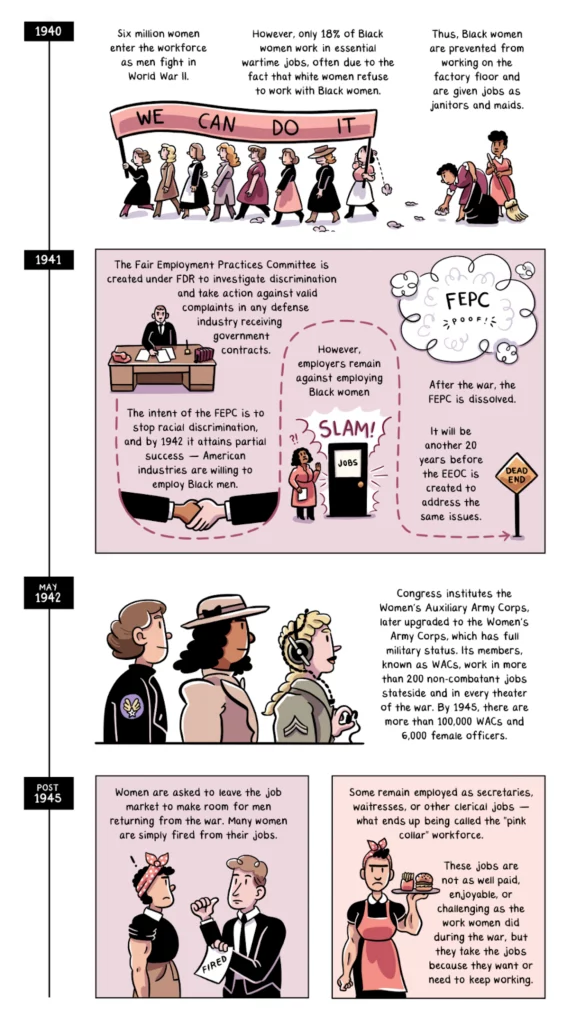Why we chose to highlight women's history in the workforce in our July training
As Spanish philosopher George Santayana once said, “Those who cannot remember the past are condemned to repeat it.” Or, as we at Ethena say, “Those who cannot remember how to properly treat their colleagues probably took ineffective training.” This past month, the philosophies behind both of these aphorisms (Okay, ours isn’t an aphorism yet, but give it time.) joined together in the form of our continuous learning nudge: Women’s Equal Pay Day.
What is Women’s Equal Pay Day?

In this nudge, we used a historical lens in order to contextualize Women’s Equal Pay Day as well as acknowledge the long and complicated history of women in the workforce.
If you’re unfamiliar, Women’s Equal Pay Day illustrates the gender pay gap by marking the day that women would have to work until to earn the same amount as men. (Note: Data on the gender wage gap is largely based on binary terms, women and men, and we hope that changes in the future!) Think of it this way: if there were a racetrack and men were given a Ferrari and women were given roller blades, it might take women a little bit longer to finish the course.
Women’s Equal Pay Day in the United States was March 24th, meaning women would have had to work until that day to earn what men earned annually the previous year. When we get even more specific and look at different racial demographics, the dates vary even more greatly. The pay gap isn’t the first obstacle that women have had to overcome in the workplace (not by a long shot), and it likely won’t be the last. That’s why, for this nudge, we turned to history.
Looking Back to Look Forward
You’ve heard us say before that repetition is key to adult learning (and we have the EEOC’s backing on that one). But when it comes to history, as we know, repetition can be damning. To directly address this, we provided our learners with tips on how they might respond to the information being given to them in the nudge. These tips and takeaways are especially important for topics that might be described as, well, bummers. How might we take all that we’ve learned and apply it to today’s workplace rather than getting bogged down by injustice?
Here’s one of the takeaways we provided our learners for this nudge:

By drawing comparisons between the historical context and today, we hope to illuminate patterns of behavior or ways of thinking (the good and the bad). Once we are able to note problematic patterns, that’s when we can start to create real change.
Not Your Average History Lesson
As a woman in the workforce myself (hi, it’s me, Mallory, pleased to meet you), I am proud that our nudge both recognizes how far women in the workforce have come as well as acknowledges our continued shortcomings when it comes to workplace equality. And I’m not the only one. This nudge currently has a 91% positive rating on our platform. Part of what makes it so special is the illustrated timeline that we used to deliver the history lesson.
Here on the Ethena content team (where I work, but this sentiment is shared across the company), we believe we can change the course of history—bold but true! We also believe the way to do so likely won’t look like any of the training we’ve seen before (especially since the EEOC has said that traditional training is ineffective, and they’re, you know, experts on the matter). Knowing that, we created the illustrated timeline that one learner called, “god-tier.” Just look at it!

Making a Name for Ourselves
When all is said and done, our aphorism about effective training might not have the same impact that George Santayana’s quotation did, but the real test will be whether the other things we’ve said—the research we cite, the resources we provide, the tips we offer, and yes, the jokes we make—will have a lasting change on our workplaces. We can’t predict the future, but based on the feedback we’ve received (on this nudge and others) about learners feeling seen, heard, and helped in a way that they never experienced from other compliance trainings, we’re feeling good about our odds.
After all, well-behaved trainings seldom make history. (Or, you know, something like that.)








